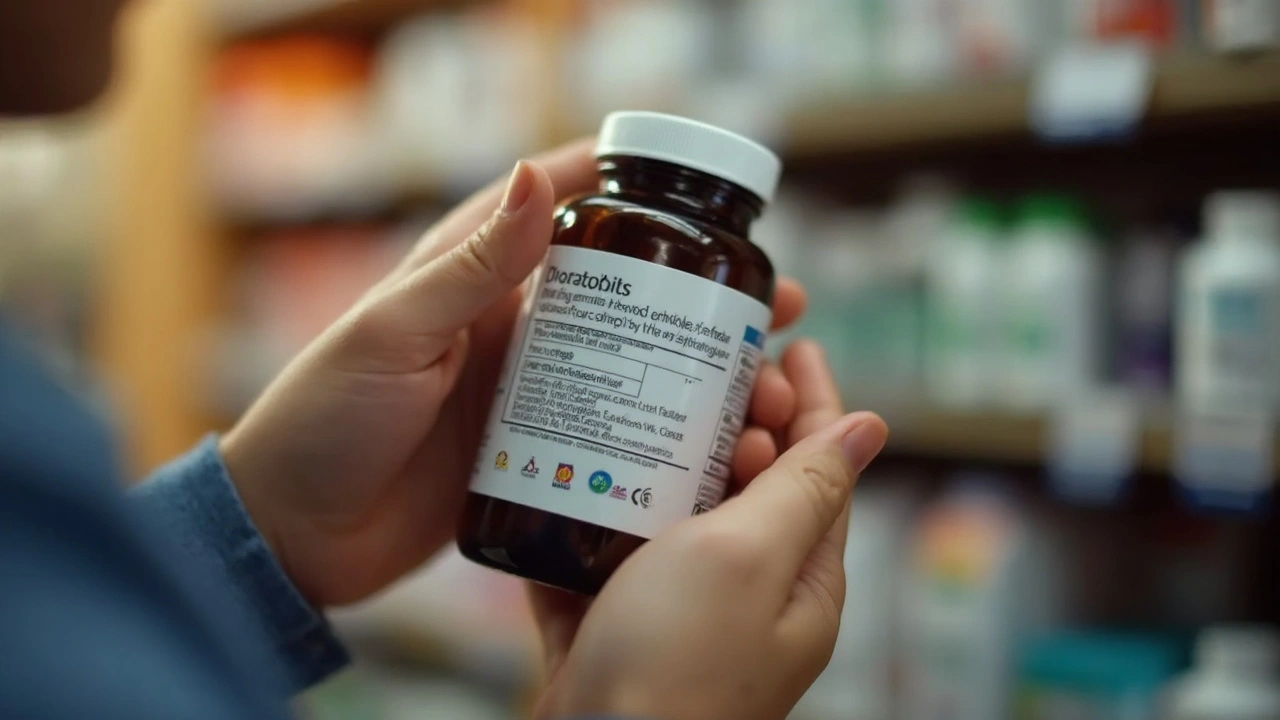The Key Players: Selenium, Zinc, Ashwagandha, and Their Impact on Thyroid Health
The thyroid is tiny, but wow, it can cause big trouble when it’s off balance. Most people chasing better thyroid health end up hearing about selenium and zinc before anything else. Let’s get straight to it: your thyroid absolutely needs these minerals.
Start with selenium. This mineral is a superhero for thyroid enzymes—specifically, it helps turn thyroid hormone T4 into its more active buddy, T3. In places with very low selenium in the soil, thyroid disorders pop up way more often. Europe saw a selenium drop in grains after importing more American wheat, and thyroid issues quietly ticked upward in those areas. It’s not wild coincidence. Your thyroid uses a ton of selenium: a gram of thyroid tissue has more selenium than almost any other part of your body.
So how much do you need? Adult doses of 55 micrograms a day are the official bare minimum, but most trial data uses 100 to 200 micrograms for thyroid issues—usually as selenomethionine. Lean on food first: Brazil nuts are packed with selenium, sometimes over 90 micrograms per nut. But be careful. Too much can make you sick—nausea, brittle nails, even hair loss kick in at high doses. Don’t self-diagnose and pop selenium like candy.
Zinc is another true player. The thyroid and pituitary talk through signals that are partly built from zinc. People low in zinc are often sluggish, tired, and can’t shake off colds. A lot of folks with hypothyroidism are lowish in zinc, especially vegans and vegetarians. Doses? The upper nutrition limit is 40 mg per day, but if you’re going for short bursts (like 15 mg daily for a few months) you’re probably safe. Oysters and beef are staples for zinc. Some multivitamin-mineral combos skimp on the real stuff and add zinc oxide, which isn’t well absorbed. Instead, check for zinc picolinate or gluconate on labels—they’re gentler on your stomach and way more useful for your body.
Ashwagandha is a whole different animal—a plant, actually, used for centuries in Indian medicine. It’s in the spotlight because studies show it helps balance thyroid hormones (especially in people who are on the low side), easing stress that can make thyroid issues worse. In a 2018 placebo-controlled trial, people with mild hypothyroidism who took ashwagandha supplements watched their TSH (the thyroid-screaming hormone) drop and T3/T4 levels rise—sometimes by more than 20%. Not bad for a single herb. Ashwagandha works slowly though—think weeks, not days—and it also tends to ease anxiety and help with sleep. Some folks get mild stomach irritation, but most tolerate it fine. A standard supplement dose is around 600 mg a day of root extract. Watch out if you’re on thyroid meds; it can shift your needs.
Just a heads up: there’s no magic bullet. If someone promises overnight results from any OTC supplements, run the other way. It’s about gentle nudges, not miracles.

Other Popular Supplements: Iodine, Vitamin D, Probiotics, and Herbal Allies
Iodine almost always comes up, and with good reason—the thyroid soaks up iodine to make its hormones. But here’s the twist: too little or too much can mess things up. Decades ago, iodine deficiency was the leading cause of goiter in the U.S. and Europe. That’s pretty rare nowadays, thanks to iodized salt and dairy. But trendy diets or strict vegan eating can still leave people shy on iodine. If you eat seaweed snacks often, watch out—kelp and dulse can pack hundreds of times more iodine than you need. The sweet spot: around 150 micrograms per day. More isn’t better, so don’t dump in iodine drops unless you confirm you’re low. It’s worth getting a thyroid panel plus a urinary iodine check with your doctor before winging it.
Vitamin D is a huge player behind the scenes. It doesn’t make thyroid hormone, but it can help modulate your immune system. People with autoimmune thyroid issues (like Hashimoto’s) are much more likely to be D-deficient, especially in places with long winters. If you catch every bug in the office and your vitamin D is low, treating that deficiency may indirectly help your thyroid recovery. Most people feel safest around 2,000 IU daily, but some need more. Just get your blood levels checked—randomly mega-dosing D isn’t smart.
Probiotics quietly influence thyroid health, too. Here’s why: around 20% of thyroid hormone gets converted from T4 to T3 by bacteria in your gut. Mess up your gut flora—too many antibiotics, too much sugar, stress eating—and your thyroid can’t reach its full power. Bifidobacterium and Lactobacillus blends are the stars in studies that track better thyroid numbers and even dropped inflammation markers in folks with Hashimoto’s. If you’re new to probiotics, start low—one capsule or half a scoop—and build slowly if your stomach feels off at first.
I should bring up a few herbal options you’ll stumble across online: guggul, bladderwrack, and motherwort. Guggul (from Commiphora mukul) is a resin with a long folk use for sluggish thyroids. A handful of older studies—most from India—suggest that guggulsterones in the resin might stimulate thyroid hormone release. Bladderwrack is a type of seaweed, and while it’s a source of iodine, dosing and purity are all over the map. Motherwort relaxes nerves and can help some of the heart symptoms tied to thyroid swings. But honest warning—herbs aren’t risk-free. Purity, contamination, and drug interactions can be real problems. Choose trusted brands, and loop your doctor in if you’re trying something new.
A lot of folks ask if these supplements replace medication. The short answer? Sometimes, for very mild cases. More often, they support traditional treatment. If you want a bigger list of natural alternatives to synthroid, you can see real-world options some people have swapped in or used alongside their prescriptions—some with surprisingly good results.
Last pro tip for this section: don’t mix and match ten new pills at once. Start with one change, track symptoms, and repeat labs every few months if possible.

Tips for Getting Results: Picking Quality Supplements and Avoiding Pitfalls
Walk into any health store and you’ll see shelves stuffed with thyroid support blends, all screaming miracle promises. Don’t jump at fancy labels or ‘natural’ claims—some cheap brands use fillers, sprinkle in tiny amounts of active ingredients, or source their minerals from low-quality suppliers.
Here’s what I’ve learned (the hard way): Always check the details. Look for independent testing badges like USP, NSF, or ConsumerLab labels. If a brand hides behind ‘proprietary blend’ instead of showing every ingredient dose, move on. You want to know what you’re taking and in what amounts. Pay attention to the actual form of each mineral—remember, chelated selenium (like selenomethionine) and zinc picolinate are best absorbed. Same for magnesium, if you ever add it: opt for glycinate or citrate forms.
Tablets versus capsules? It matters less than you think, but capsules are usually easier on your stomach. My husband had a bad reaction to bargain supplements with lots of binders—it took us forever to realize what was happening. Clean ingredient lists are your friend.
- Check expiration dates—expired selenium or zinc can degrade faster than you’d expect.
- Look out for additives like maltodextrin, artificial dyes, or talc, especially if you have allergies or sensitivities.
- Don’t fall for megadose hype. More of a good thing isn’t always better—especially with minerals like selenium.
If you want to see results, give any new supplement at least 6-8 weeks. Many people start with high hopes, only to quit too soon. Keep a simple tracker: jot down your sleep, energy, mood, or skin/hair condition every week. Turns out, changes can be subtle or slow, but tracking helps you spot progress (or side effects) before blood tests even catch up.
When in doubt, ask your doctor for a baseline thyroid panel—TSH, free T4, and free T3. Vitamin D and ferritin (stored iron) also matter for thyroid folks. Don’t ignore odd symptoms—racing heart, mood swings, unexplained weight drops, or swelling deserve a call to your provider.
If you need a quick cheat sheet, here’s how popular options stack up by science and safety:
| Supplement | Standard Dose | Main Benefit | Main Risk |
|---|---|---|---|
| Selenium | 100-200mcg | T4 to T3 conversion | Toxicity if overused |
| Zinc | 10-40mg | Supports thyroid signaling | Nausea, Copper loss |
| Ashwagandha | 600mg extract | Stress relief, balances hormones | Mild stomach upset |
| Iodine | 150mcg | Thyroid hormone production | Over/underactive thyroid |
| Probiotics | 1-10 Billion CFU | Gut–thyroid conversion | Bloating if started too fast |
| Vitamin D | 1000–2000 IU | Immune balance | Toxicity if megadosing |
If you already take thyroid medication, always check with your doctor before jumping on new supplements. Some, especially calcium or iron pills, can block your prescription from being absorbed for hours. And if anything weird pops up after you start a new routine—itchiness, palpitations, headaches—pause and get advice.
There’s a lot of noise out there, but quality OTC supplements for thyroid health can make a concrete difference, especially if you’re patient, picky with brands, and thoughtful about tracking changes. You don’t have to do this alone—team up with your medical provider so you can celebrate the wins (like better energy or clearer skin) with real peace of mind.


5 Comments
May 4, 2025 Stephen Gachie
The thyroid is a tiny organ that governs so much of our daily vitality and yet most people treat its needs with the same casualness they reserve for a morning coffee. Selenium and zinc are not just trendy hashtags they are essential cofactors in the enzymatic pathways that convert T4 into the active T3. Without adequate selenium the deiodinase enzymes falter and the body is left with a hormonal lag that feels like a fog. Zinc on the other hand fuels the pituitary signals that tell the thyroid when to step up or down. Many vegans and vegetarians miss out on zinc because plant based diets lack the highly bioavailable forms found in meat. The form of each mineral matters; selenomethionine for selenium and zinc picolinate for zinc are the ones that survive the acidic journey to the bloodstream. Ashwagandha, though an herb, can modulate the hypothalamic pituitary axis and reduce the stress load that often exacerbates thyroid dysfunction. The herb works gradually and should be seen as a supportive adjunct rather than a replacement for medication. Iodine remains a double edged sword too; the sweet spot is narrow and both deficiency and excess can tip the gland into disorder. Vitamin D does not make thyroid hormone but it steadies the immune system which is crucial for autoimmune thyroid conditions. Probiotics quietly influence the gut microbiome which in turn handles a portion of T4 to T3 conversion. The quality of supplements is paramount many brands hide behind proprietary blends that obscure the true dosage. Look for third party testing badges such as USP or NSF to ensure you are not ingesting fillers or sub‑therapeutic amounts. Tracking your symptoms and scheduling repeat labs every few months is the only way to know if the regimen is truly shifting your hormone profile. Patience is required because hormonal cycles operate on weeks not days. In the end a thoughtful combination of diet, targeted supplements, and medical oversight can restore balance and lift the cloud of fatigue that often hangs over those with thyroid imbalance.
May 16, 2025 Sara Spitzer
Most of these so‑called miracle blends are just marketing fluff.
May 27, 2025 Jennifer Pavlik
Hey there, if you’re feeling a little lost just start with a single thing like a Brazil nut a day for selenium and see how you feel before adding more.
June 8, 2025 Jacob Miller
Honestly you should be careful about giving strangers unsolicited health advice it’s not your place to tell people exactly what to put in their bodies and many of these supplements can interact with prescription meds so a doctor’s sign off is really important.
June 19, 2025 Anshul Gandhi
Don’t be fooled by the mainstream narrative that big pharma hides the truth about natural thyroid cures the real reason they push synthetic pills is to keep the profit machines humming and the only way to break free is to source high‑grade, independently tested mineral forms and avoid the corporate‑approved supplement lines that are intentionally diluted.
Write a comment